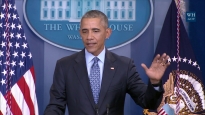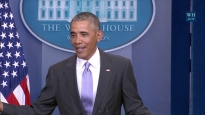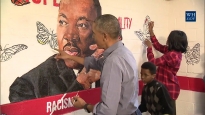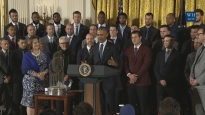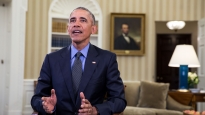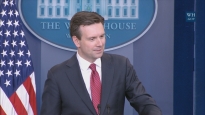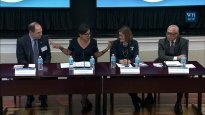President Obama Tours Storm Damage in New York City
November 15, 2012 | 8:07 | Public Domain
President Obama discusses the response to Hurricane Sandy after touring parts of New York City affected by the storm.
Remarks by the President After Surveying Damage from Hurricane Sandy
Cedar Grove Avenue
Staten Island, New York
2:01 P.M. EST
THE PRESIDENT: Thank you so much, everybody. I’m going to be relatively brief. I came up here right after the storm, was on the Jersey side, and I promised to everybody that I was speaking on behalf of the country when I said we are going to be here until the rebuilding is complete, and I meant it. So I’m going to come back today, but I’m also going to be coming back in the future to make sure that we have followed through on that commitment.
I want to thank the outstanding leadership that’s been provided by state and local officials. Obviously, Governor Cuomo and Mayor Bloomberg have done an outstanding job. To borough president Molinaro, thank you so much for your leadership at a time when the folks here on this island were obviously going through extraordinarily difficult times, the people of Long Island who are going through really tough times.
Across the board, what we’ve seen is cooperation and a spirit of service. And for the first responders who are here, the police officers, the firefighters, the EMS folks, the sanitation workers who sometimes don’t get credit but have done heroic work, we are so grateful to you because you exemplify what America is all about. I’m grateful to the Red Cross who has been so responsive not just here, but in disasters around the country. And I want to thank all the volunteers. As we were shaking hands over there, we had folks from every part of the country. We had some Canadians who had come down to help out.
And during difficult times like this, we’re reminded that we’re bound together and we have to look out for each other. And a lot of the things that seem important, the petty differences melt away, and we focus on what binds us together and that we as Americans are going to stand with each other in their hour of need.
Now, more specifically, we are now still in the process of recovery. As you can see, as you travel around parts of Staten Island, as we flew over parts of -- other parts of the city and the region that had been impacted, there is still a lot of cleanup to do. People still need emergency help. They still need heat. They still need power. They still need food. They still need shelter. Kids are still trying to figure out where they’re going to school. So there’s a lot of short-term, immediate stuff that has to be dealt with. And we are going to make sure that we stay here as long as people need that immediate help. That’s FEMA’s primary task. And we’ll be coordinating closely with state and local governments to make sure folks are getting the short-term help.
But what we’ve also already heard is that there’s going to be some long-term rebuilding that’s required. You look at this block and you know that this is a community that is deeply rooted. Most of the folks that I met here have been here 20, 30, 50 years. They don't want to see their community uprooted, but there’s got to be a plan for rebuilding, and that plan is going to have to be coordinated, and they’re going to need resources.
So what I’ve committed to doing is to work with the outstanding congressional delegation led by your Senators Chuck Schumer and Kirsten Gillibrand, also working with Governor Christie and the Jersey delegation to try to come up with a game plan for how we’re going to be able to resource the rebuilding process.
And I’m confident, as Governor Cuomo said, that we’re going to be able to do it. But it’s going to require everybody focused on getting the job done. We’re going to have to put some of the turf battles aside. We’re going to have to make sure that everybody is focused on doing the job as opposed to worrying about who is getting the credit or who is getting the contracts or all that stuff that sometimes goes into the rebuilding process.
On the federal level, because this is going to be such a big job, I wanted to assign one particular person who would be in charge from our perspective, who would be our point person -- because FEMA basically runs the recovery process, it doesn't focus on the rebuilding. For that, we’ve got to have all government agencies involved. Janet Napolitano has done a great job with respect to DHS, but we thought it would be good to have a New Yorker who is going to be the point person. And so our outstanding HUD Secretary, Shaun Donovan, who used to be the head of the New York Housing Authority -- so he knows a little bit about New York and building -- is going to be our point person. And he's going to be working with the mayor, the governor, the borough presidents, the county officials to make sure that we come up with a strong, effective plan. And then, I'll be working with the members of Congress to do everything we can to get the resources needed to rebuild. And I have every confidence that Shaun is going to be doing a great job, and so people should feel some confidence about that.
Let me just close by saying this: I had the opportunity to give some hugs and communicate thoughts and prayers to the Moore family. They lost two young sons during the course of this tragedy. And obviously, I expressed to them -- as a father, as a parent -- my heartbreak over what they went through. And they're still obviously a little shell-shocked.
But they came here in part because they wanted to say thank you to all the people who have been supportive of them. They in particular mentioned Lieutenant Kevin Gallagher of the NYPD, who, when they knew that their sons were missing, Lieutenant Gallagher made a point of staying with them and doing everything he could so that ultimately they knew what had happened with their boys and were able to recover their bodies, and has been with them as a source of support ever since.
That's not in the job description of Lieutenant Gallagher. He did that because that's what so many of our first responders do. They go above and beyond the call of duty to respond to people in need. And so I want to give a shout-out to Lieutenant Gallagher, but I also want to point out, the Moores, even in their grief, asked me to mention Lieutenant Gallagher, and that says something about them as well.
And that spirit and sense of togetherness and looking out for one another, that's what's going to carry us through this tragedy. It's not going to be easy. There's still going to be, believe it or not, some complaints over the next several months. Not everybody is going to be satisfied. I have to tell you the insurance companies and some of the other private sector folks who are involved in this, we need you to show some heart and some spirit in helping people rebuild as well.
But when I hear the story of the Moores and I hear about Lieutenant Gallagher, that's what makes me confident that we're going to be able to rebuild.
I'm very proud of you, New York. You guys are tough. You bounce back, just as America always bounces back. The same is going to be true this time out. All right, thank you very much, everybody. (Applause.)
END
2:08 P.M. EST
|
January 18, 2017
|
January 17, 2017
|
January 16, 2017
|
January 16, 2017
|
|
January 14, 2017
|
January 13, 2017
|
January 13, 2017
|
January 12, 2017
|
